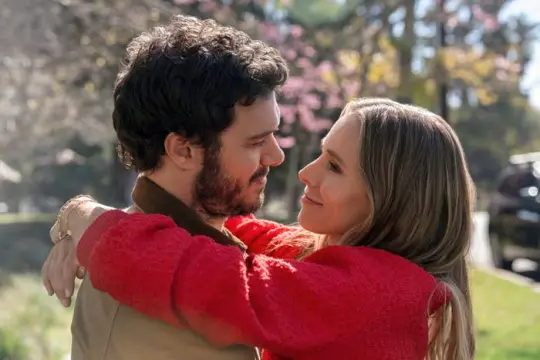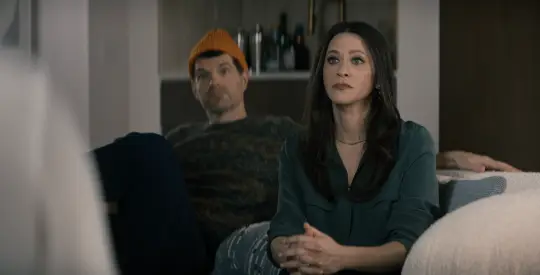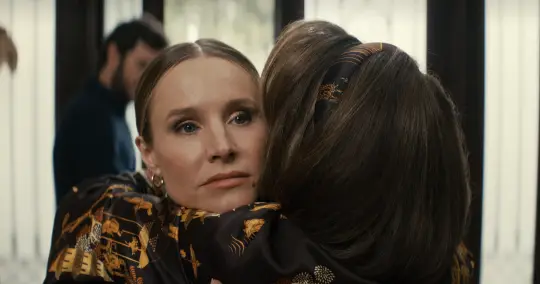
Netflix
Last month, ahead of the release of the now much-discussed and widely beloved Netflix rom-com series “Nobody Wants This,†stars Adam Brody and Kristen Bell appeared on the “Armchair Expert†podcast.
They spoke candidly with hosts Dax Shepard (Bell’s husband) and Monica Padman about their chemistry, as well as that earth-shattering first kiss that has since sparked a million memes — and the Brody-ssance that many of us have been waiting for since “The O.C.â€
Brody, it turns out, had a gripe with the kiss scene: He felt it would be unrealistic for his character to tell Bell’s to put her purse down on the Los Angeles sidewalk.
Watching the show, even the most germaphobic, purse-toting, city-dwelling among us were able to suspend our disbelief in the name of that chemistry, that kiss.
But there was something else about the series that didn’t jibe with a lot of otherwise besotted viewers, myself included: its cartoonish portrayal of Jewish women. Almost as soon as the glowing reviews hit, so too did the critiques on sites like Time and Vulture — and, of course, on X, formerly Twitter.
In one post, freelance writer Miriam Handel said, “adam brody is so hot in nobody wants this that it’s making me overlook the lowkey diabolical way in which jewish women exist on the show.â€
Low-key diabolical, indeed. “Nobody Wants This†was inspired by creator Erin Foster’s real-life experience being a non-Jewish woman who falls in love with a Jewish man. (Foster later converted to Judaism.) In the television version, there are higher stakes: Brody plays a hot rabbi named Noah and Bell plays Joanne, who ― as we are reminded countless times ― is a “shiksa.†The word, derived from Yiddish, has been used historically (and often disparagingly) to describe a usually blond, non-Jewish woman who tempts an otherwise God-fearing man to stray from his religious marital expectations.

Netflix
The show delivers in the sense that we, as a society, have been starved of truly delightful, pulpy romantic comedies with sharp dialogue and complicated characters. I admit to tearing up when Joanne opens up about her relationship fears and when Noah creates a makeshift “first Shabbat†for Joanne in the middle of a restaurant.
And, oy, I really, really wish I could leave my assessment at that.
But from the opening scenes, it becomes clear that there are two distinct groups of characters in the movie: Jewish women, and the people who tolerate them.
Bina — Noah’s overbearing mother, played by Tovah Feldshuh — sees red at the mere sight of Joanne at Friday night services. Bina is upstaged only by Noah’s uptight and mean-spirited sister-in-law, Esther, played by Jackie Tohn.
“I was offended by the portrayal of Jewish women, particularly with Esther,†said Hannah Orenstein, an author and editor who lives in New York. “She’s bossy, manipulative, sexless, treats her husband like shit, and is rude to Joanne partly because of her identity.â€
Esther also happens to be best friends with Rebecca, played by Emily Arlook. Rebecca is Noah’s Jewish ex-girlfriend, whom he breaks up with after finding out that she has managed to locate an engagement ring in a locked drawer and starts wearing it before ever being proposed to. The implication here, in my opinion, is that for a Jewish woman, the goal is marriage at all costs, romance be damned. So, some of the iciness toward Joanne did make sense.
“I didn’t mind when Esther was rude to Joanne out of loyalty to Rebecca ― that tracked for me,†Orenstein said. “If she was just one of those things, fine. But all together, it’s such an over-the-top stereotype.â€

Netflix
In contrast, Joanne and her younger sister, Morgan, played hilariously by Justine Lupe, are, sure, depicted as manic, but in a lovable, go-with-the-flow kind of way not afforded to their Jewish counterparts.
“I really didn’t like seeing yet another depiction of Jewish women as nagging, loveless wives,†Orenstein said. “The show did tenderness really well. What if they had brought some of that warmth to Esther and Sasha’s relationship?†she asked, referring to Esther’s husband, played by Timothy Simons.
My friend Emma Gray, a former HuffPost staffer, touched on that same sentiment in a review for her Rich Text newsletter, writing, “The Jewish women of ’Nobody Wants This’ exist only in opposition to Joanne and Morgan, and their paper-thin rendering takes a show that contains so much deliciousness, and turns it all a bit sour.â€
I am tempted to laugh the whole thing off as pure comedy, to question if it’s really that big of a deal, to wonder if I’m making a Semitic mountain out of a Semitic molehill. That’s partially because there are some truths lurking beneath the ghoulish caricatures: I have, on more than one occasion, been lovingly grilled about my romantic life by my meddling grandmother.
But for me, and others, the vitriol seen in the series just did not ring true.
“I know families who are close-knit and really want their kids to marry someone Jewish,†Orenstein said. “That felt real to me. What didn’t feel real was the rabid intensity with which they openly hated on Joanne. I know some people who are upset that their kids’ partners aren’t Jewish. But publicly, the vibe is more disappointment, not cold or aggressive.â€

Netflix
That lack of reality may be the show’s biggest problem. Satire pokes fun at its subjects and can be extremely effective when used correctly. (See: “Curb Your Enthusiasm.â€) But most of the choices these characters make feel unlike how anyone would act in real life. Reducing characters to their least desirable traits without sufficient comedic payoff just ends up feeling mean-spirited.
“I didn’t see their behavior as a reflection of the experiences I have of Jewish women in my community,†said San Francisco Bay Area-based Ava Feldman (who is not related to the author of this story). relationships
To Foster’s credit, the Los Angeles Times noted in an interview that “heading into the writers room, she said she purposefully surrounded herself with colleagues who were born Jewish.†But, when asked how she feels about critics calling the Jewish characters “stereotypical,†her response left me wanting more. (She did not return a request for comment for this story by the time of publication).
“I think we need positive Jewish stories right now,†Foster told the LA Times. “I think it’s interesting when people focus on, ‘Oh, this is a stereotype of Jewish people,’ when you have a rabbi as the lead. A hot, cool, young rabbi who smokes weed. That’s the antithesis of how people view a Jewish rabbi, right? If I made the Jewish parents, like, two granola hippies on a farm, then someone would write, ‘I’ve never met a Jewish person like that before. You clearly don’t know how to write Jewish people, you don’t know what you’re doing, and that doesn’t represent us well.’â€
Maybe. I don’t know. I think about television shows like “The Marvelous Mrs. Maisel†or movies like “You Are So Not Invited to My Bat Mitzvah,†which Feldman said “felt very authentic as a portrayal of a modern Jewish family dynamic.†And I wonder what “Nobody Wants This†would have been like had it explored complicated family relationships without reinforcing diminishing and potentially damaging stereotypes.
Most of the people I spoke to finished the series with similar feelings: They both truly enjoyed and were disappointed by it ― especially, in some cases, the ending.
“I thought Joanne had come to a very mature conclusion, and the idea of someone giving up their entire career for someone they’ve been dating for less than three or four months felt very extreme,†Feldman said.

Netflix
Orenstein echoed that sentiment. “Interfaith relationships can absolutely work,†she said. “But religion is Noah’s world, and no matter how accepting Joanne is, I think she’d ultimately be miserable. She’d have to prioritize a value system that doesn’t mean anything to her.â€
Ultimately, when it comes to pulpy rom-coms, we have to be willing to suspend our disbelief. Ofcourse they were going to end up together, dream jobs be damned. Of courseshe put her purse on the sidewalk.
But what nobody wants (or, at least, I don’t want) is to be expected to suspend the disbelief that we can’t see ourselves depicted as the complete, complicated people we are in the media we consume ― satire or otherwise.
This article originally appeared onHuffPost.





No comments yet
Be the first to share your thoughts!